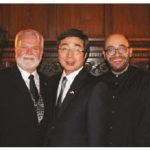
Over its 50-year history, Friends of the National Arts Centre Orchestra (FNACO) has raised thousands of dollars for music education for students. But it couldn’t do what it does without the help of dedicated diplomats.
FNACO launched in 1969, at the same time as the National Arts Centre opened its doors. Then, the organization’s mission was to fill seats in the concert halls, but that’s since morphed into a role in which it now raises money for the NAC music department. The role has evolved because the National Arts Centre Foundation, which was formed in 2000, also raises funds to support the NAC’s work.
The two fundraising models FNACO now uses are both hosted by diplomats. In the first, an ambassador offers to host an intimate dinner for 12 to 20 people, each of whom pays about $150 a ticket. There’s always a small musical performance, usually by student musicians, beforehand. For the second, at a $100 ticket price, the ambassador hosts a concert, usually with NACO musicians, for between 30 and 400 people followed by a buffet dinner.
For 2019, the embassy of Japan kicked things off with a concert for 50 people. The Swedish ambassador hosted a dinner in February and the Hungarian and Filipino ambassadors will each to do two events — a sit-down dinner and a buffet. The Moroccan, German, Pakistani and Austrian missions will also hold an event this year.
With that participation, FNACO is forecasting revenues of $50,000 this year, a fitting amount for a 50th anniversary.
“We have almost an event per month,” says FNACO president Albert Benoit. “There’s a lot of eagerness [on the part of diplomats] to support us.”
Many embassies sign on once and then make a yearly commitment thereafter. Turkey, for example, hosted an event five years in a row.
“It’s a win-win for us and the ambassadors,” Benoit says. “The win for them is to be visibly supporting an activity in the community. Many of the ambassadors have an interest in music. The ambassador of Hungary is a musician himself. It helps to get them out of the diplomatic circle and meeting other Canadians, as well. An ambassador’s spouse once said: ‘We’re delighted to meet some real people.’”
Hungarian Ambassador Balint Ódor is an enthusiastic supporter.
“I was honoured to host two special concerts last year,” he says. “My residence is a perfect venue for smaller house-style concerts. I thought it would be great to invite talented Canadian musicians to perform at the embassy and, at the same time, to support the National Arts Centre. The only thing I asked from FNACO is that the musicians perform at least one piece by a Hungarian composer. Classical music brings people closer — especially in a house-style concert format.”
Philippines Ambassador Petronila Garcia says music is a way to share culture.
“Music is something all cultures share and it is a language that we can all understand regardless of our background,” Garcia says. “We are happy to support music in the Ottawa community and, at the same time, share the culture of the Filipino people with them.”





